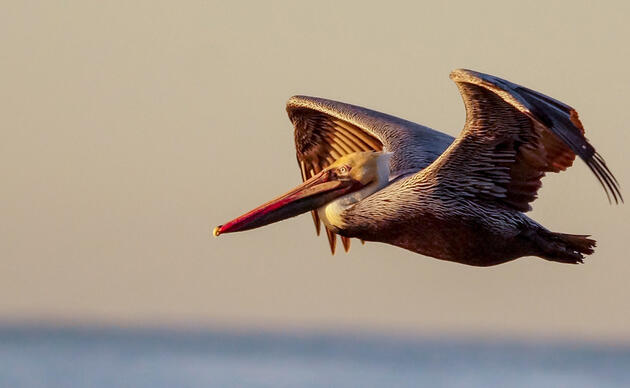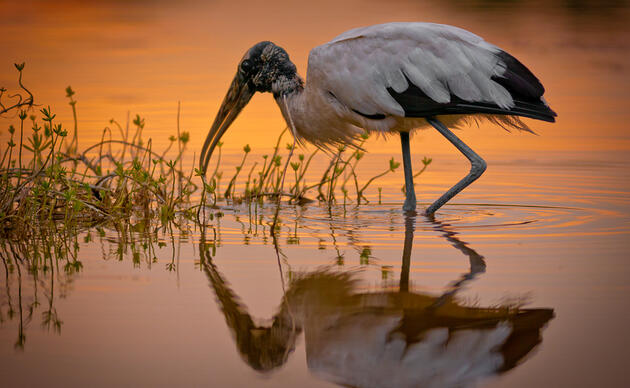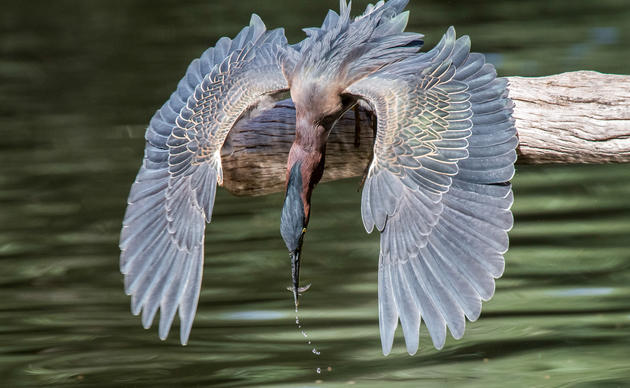An exciting, tumultuous 2024 legislative session has come to an end, and there are still a few issues left unresolved. We had a few big wins for birds this year, we worked hard to avoid policy changes that could have negative impacts, and we are left with a few priorities to continue to fight for next year.
Working Lands Win
A priority for Audubon SC going into this year’s session was H.3951, the Working Agricultural Lands Preservation Act. It passed early in session and Audubon staff joined Governor McMaster as he signed it into law! This bill created a program through the SC Conservation Bank to help working farms stay farms through voluntary conservation easements, which benefits grassland birds like Northern Bobwhite quail and Eastern Meadowlarks.
A New State Seabird
We were excited when Representative Spencer Wetmore introduced H.5246, designating the Black Skimmer as South Carolina’s state seabird. This is a new state designation and does not change the Carolina Wren as our state bird. In the last few weeks of session, it passed the House and was sent over to the Senate. There, after consultation with us, other partners and the SC Department of Natural Resources, Senators made the decision to amend the bill to instead designate the Brown Pelican as our state seabird. The House agreed and the bill will now go to the Governor for signature!
As one of our most charismatic and well-known seabirds, the Brown Pelican is certainly deserving of this designation. Brown Pelicans are a priority species for Audubon SC, and one that benefits from Audubon's work along our coast. Pelicans nest on a handful of small islands along our coast and are susceptible to human disturbance and habitat loss. Conserving South Carolina's Brown Pelican population will benefit Black Skimmers and other threatened species.
Wetlands Protections and Land Use Policy Pushed to Next Year
We also made an effort to address wetlands protection and support land use policy changes that would incentive land conservation, including H.4996 that authorized Transfer of Development Rights (TDR) programs. TDR programs empower landowners to sell development rights to others, promoting responsible growth and efficient land use by shifting development to denser, more suitable areas, while conserving environmentally sensitive areas. Unfortunately, these efforts did not pass the General Assembly this year. Audubon SC will spend the offseason working with our elected officials, partners, and other stakeholders on these issues and come back next year with new legislative proposals.
Energy Reform Unresolved
The biggest topic throughout session was energy reform. After H.5118 was introduced and received significant opposition, the House passed an amended bill that still fell short of the balanced approach we have advocated for. While the Senate agreed with advocates that significant energy reform needed to wait until next session, they still passed a version of H.5118 that consisted of a non-binding resolution declaring comprehensive energy reform is needed. The House and Senate were unable to come to an agreement on the bill and decided to appoint a conference committee to resolve differences between their current (and very different) versions of H.5118.
Now, three Senators and three Representatives have the opportunity to negotiate the differences between the two versions of the bill to see if they can come to an agreement. We hope the Senators will remain strong in their position that any substantial energy reform needs more work over the fall.
Regardless of the outcome of conference committee, there will still be a lot of work to do on energy policy. Audubon SC will continue to work with partners, legislators, and stakeholders on all sides of this issue to find pragmatic, commonsense policy solutions that support a clean energy future, embrace proactive transmission infrastructure planning, and avoid rollbacks of regulatory protections for birds and our natural resources.
State Budget Also Still Pending
Lastly, next year’s state budget is still not yet finalized and a conference committee of legislators from the House and Senate will return to Columbia to work out differences between their respective budgets. Some of our priority items include funding for land conservation and management through the new Working Agricultural Lands Preservation Program, along with agency budgets for the Conservation Bank, Department of Natural Resources, Forestry Commission, and Office of Resilience.
To receive updates on our policy work and receive opportunities to speak up for birds straight to your inbox, please sign up here.








